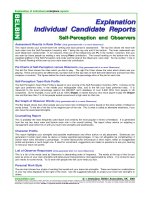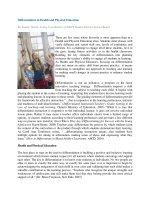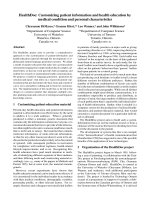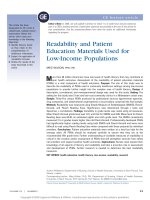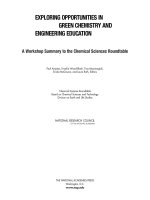Self efficacy and FL education
Bạn đang xem bản rút gọn của tài liệu. Xem và tải ngay bản đầy đủ của tài liệu tại đây (2.62 MB, 102 trang )
Self-Efficacy and Foreign Language Education
Nicole Mills
National Middle East Language Resource Center
Brigham Young University
April 19, 2013
Presentation
What is Self-Efficacy?
What does self-efficacy do?
Where does self-efficacy come from?
What are current areas of self-efficacy research?
Why would you assess self-efficacy in the foreign language classroom?
How do you assess self-efficacy?
What are the results of self-efficacy research in foreign language learning?
How does current self-efficacy research link to the teaching of less commonly taught
languages?
How do I foster self-efficacy in the LCTL classroom?
What is Self-Efficacy?
Social Cognitive Theory
Individuals possess a system of self-beliefs that enables
them to exercise control over their thoughts, feelings, and
actions
Self-Efficacy
“People’s judgments of their capabilities to organize and
execute courses of action required to attain designated
types of performances” (Bandura, 1997)
Self-Efficacy
“What people think, believe, and feel affects how they
behave” (Bandura, 1986)
Self-efficacy is often a better predictor of success than
actual abilities
Beginning with Graham & Weiner’s review of
motivational research in 1996, we have learned that
students’ self-efficacy more consistently predicts
academic performance over and above other
motivational constructs
Great voices of self-efficacy
“They are able who think they are able”
– Virgil (ancient Roman poet)
Great voices of self-efficacy
“A man who doubts himself is like a man who
would enlist in the ranks of his enemies and
bear arms against himself. He makes failure
certain by him being the first person
convinced of it.”
– Alexandre Dumas (French
author)
Great voices of self-efficacy
“Whether you think that you can or you can’t, you’re
usually right.”
– Henry Ford (Founder, Ford Motor
Company)
Great voices of self-efficacy
“If I have the belief that I can do it, I shall surely
acquire the capacity to do it even if I may not
have it at the beginning.”
– Mahatma Gandhi (activist)
Great Voices of Self-Efficacy
“Clearly it is not simply a matter of how capable
one is, but of how capable one believes oneself to
be.”
– Frank Pajares (Former associate professor of educational psychology,
Emory University)
What does self-efficacy do?
What does self-efficacy do?
Influences pursued courses of action and decisions
Influences the degree of expended effort
Influences the level of perseverance and resilience to
adversity in the face of obstacles
Influences affective states
Influences the degree of success realized
-Bandura, 1997
Where does self-efficacy
come from?
Where does self-efficacy come from?
Sources of Self-Efficacy:
Mastery Experiences
Vicarious Experiences
Emotional States
Social/ Verbal Persuasions
(Bandura, 1997)
Mastery Experiences
Outcomes perceived as successful raise self-efficacy, those
interpreted as failures lower self-efficacy
Individuals…
Engage in activities
Interpret the results of their actions
Develop beliefs about their capabilities to engage
in subsequent tasks and activities
Vicarious Experiences
Observations of others
Effects of Modeling
If the model’s attributes are similar to their own
(ex: peers, etc.), the influence of the vicarious experience is
strong
Emotional States
Emotions and Feelings experienced during task influence
self-efficacy beliefs and performance
Negative thoughts/ Fears often ensure inadequate
performance
Verbal Persuasions
Feedback from others (teachers? Peers? Mentors?)
Positive persuasions encourage & empower
Negative persuasions defeat and weaken SE
beliefs
Importance of appropriate, rigorous,
and non-debilitating feedback
What are current areas of
self-efficacy research?
Current areas of self-efficacy research
Career self-efficacy
Sports self-efficacy
Self-efficacy and diets
Self-efficacy and pain management
Parental self-efficacy
Self-efficacy and Depression
Gender gaps and Self-efficacy
Teacher Self-efficacy
Student Self-efficacy
Why would you assess
self-efficacy in the foreign
language classroom?
Why would you assess self-efficacy in the
foreign language classroom?
Evaluate students’ perceived competence in the course objectives
Evaluate the influence of a new pedagogical approach on students’ selfefficacy (pre vs. post)
Evaluate the influence of pedagogical interventions (ex: workshops, etc.)
on students’ or teachers’ self-efficacy
Evaluate the influence of teaching learning strategy techniques (ex:
reading strategies, etc.) on students’ self-efficacy
Longitudinal evaluation of self-efficacy beliefs (language requirement?)
Other reasons?
How do you assess
self-efficacy?
How do you assess self-efficacy?(quantitatively)
Creation of self-efficacy questionnaires:
The questions should be phrased in terms of “can do” as opposed
to “will do”
Questions should be linked to the outcome measure or the outcome
objectives
“How certain are you that you can…”
“Rate your degree of confidence by recording a number from 0 to 100”
0
10
Cannot
Do at all
20
30
40
50
60
70
Moderately
Certain can do
80
90
100
Highly Certain
can do


